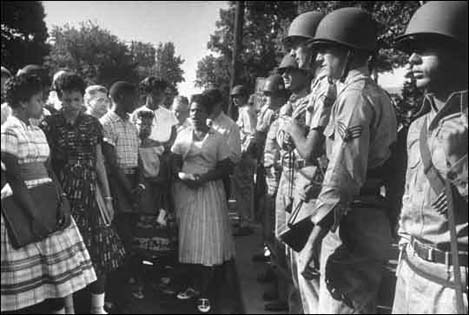 |
| Dr. Minnijean Brown Trickey presented the talk, "Social change, diversity and the fight against racism: How far have we come?" (Danny Abriel Photo) |
On her first day of high school, 16-year-old Minnijean Brown thought others would see her as she saw herself—tall, beautiful, proud. She had a sense of humor, a smile to die for, and she could sing: she’d win over her new classmates within a few weeks.
But she was wrong.
Fifty-one-year ago, she was one of the “Little Rock Nine,” the first black American students to challenge racial segregation at Little Rock Central High School. As Dr. Minnijean Brown Trickey stood in front of an overflowing audience in Dalhousie’s Student Union Building, she was introduced as a legend, a civil rights pioneer, and a true inspiration. She shrugs off the accolades and remains a humble, reluctant hero: “All we wanted to do is go to school.”
As Dr. Brown Trickey told her story, she cried openly in front of the audience. But during her year at Little Rock Central High, she made sure that no one ever saw her cry. She and her fellow black students used humor as a survival tool, repressing all of their pain and fear. But today she can cry. She thinks it’s a good thing. In fact, she cried for most of the day when Barack Obama was elected as next president of the United States.
Much of Dr. Brown Trickey’s words referenced that historic win. She is overjoyed to see a change in consciousness happening across the country—similar to what happened in Little Rock more than half a century ago.
As a TV camera recorded Dr. Brown Trickey’s words, she spoke of the media attention during her first day at Little Rock Central High. As she entered the school, she was met by 1,200 armed soldiers and television crews and reporters from across the country. Despite the notoriety, her first year of school was all about surviving—surviving daily tormenting from her peers, indifference from her teachers, and violence on a daily basis. She was kicked down stairs, knocked unconscious and spat on.
When asked if the other students and teachers at Little Rock Central High intervened, Dr. Trickey told a story that has been repeated throughout history too many times: “The children who were nice to use were beaten up and terrorized. And their parents lost their jobs.”
“There were 100 bad kids and 1,900 silent witnesses,” she added.
Over the years, Dr. Brown Trickey has tried to understand why history unfolded as it did. She tried to understand why her fellow students were so mean and violent towards her. The answer was expressed simply by one of her classmates: “We hated her because she walked up and down the halls like she belonged here.”
Today, Dr. Brown Trickey draws inspiration from the school children she meets while traveling and speaking. They inspire her by saying “I would have been nice to you. I would have talked to you.”
She regularly returns to Little Rock and returns to her old high school, which she says remains segregated. “There are white and black students at the school but they are having very different experiences. The white students are in accelerated programs which are directed towards college and higher learning. The black students are viewed as under achievers and many will not even graduate.”
Dr. Brown Trickey’s words were motivating, inspirational and pivotal at this moment in American history. “History holds up a mirror showing the good things about us and the bad things about us. We have to choose. Do we want to be part of the mob attacking children or the children walking with dignity?”
Dr. Brown Trickey’s appearance was organized by the Dalhousie School of Social Work. She has vowed to return to Halifax again in the summer to see old and new friends.
Soul Make A Path Through Shouting
Little Rock, Arkansas, 1957 By Cyrus Cassells Thick at the schoolgate are the ones I’m just going to school. Here we go to meet Can my voice be an angel-on-the-spot, I have never seen the likes of you, With their jerry-rigged faith, I’m just going to school. |

